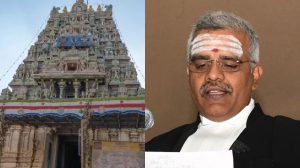
The Madras High Court has ruled that no permission is required from the police to broadcast the Ayodhya Ram Temple consecration ceremony live on private temples and marriage halls. It has also said that temples under the Hindu Religious and Charitable Endowments Department can broadcast the ceremony after informing the temple executive officer.
A petition was filed in the Madras High Court by Ganesha, the leader of the Vivekananda Hindu Movement, challenging the order of the police denying permission to conduct bhajans and charity meals at a private hall in Pattabiram, Chennai, in connection with the Ayodhya Ram Temple consecration ceremony.
In the petition, Ganesha said that he had arranged for a bhajan and charity meal program for devotees who could not travel to Ayodhya. However, the police refused permission, saying that they had not applied for permission seven days in advance, that the DMK and VCK parties had objected to the program, and that it could cause inconvenience to the public and traffic.
The petition was heard by Justice N. Anand Venkatesh as an urgent matter. The police informed the court that permission had been granted to Ganesha.
Justice Venkatesh noted that no permission is required from the police to broadcast the consecration ceremony live on private temples and marriage halls. He also said that temples under the Hindu Religious and Charitable Endowments Department can broadcast the ceremony after informing the temple executive officer and obtaining permission with appropriate restrictions.
The judge also said that the police can take action to control the crowd if it becomes too large. He also reiterated that no temples in Tamil Nadu have stopped performing rituals in connection with the Ayodhya Ram Temple consecration ceremony.
In a separate case, the Supreme Court has told the Tamil Nadu government that it cannot deny permission for a special puja at a temple simply because members of other communities live in the state. The court said that it cannot be argued that the puja should be stopped because people of different communities live in the area.
The Tamil Nadu government has said that it has not banned special pujas at temples in connection with the Ayodhya Ram Temple consecration ceremony. The government has also said that it will respond to the Supreme Court notice.
